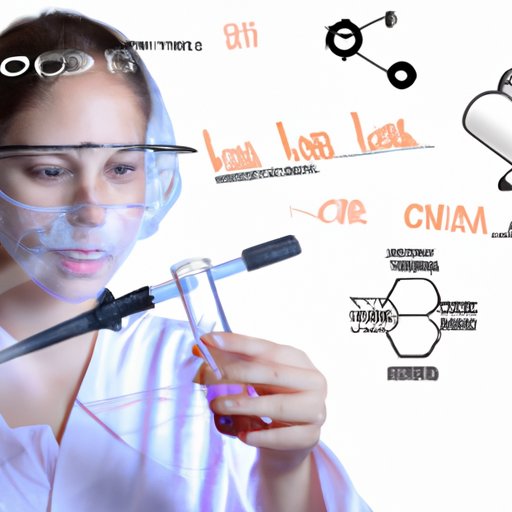Introduction
Medical laboratory science is a field that combines the use of clinical laboratory technology with the knowledge of laboratory medicine. It is a growing field with numerous job opportunities and career paths. In this article, we explore what it takes to become a medical laboratory scientist, including the educational requirements, career opportunities, and professional organizations and resources available.

Exploring the Benefits of Becoming a Medical Laboratory Scientist
A medical laboratory scientist is an integral part of the healthcare team, responsible for the analysis and interpretation of laboratory tests that diagnose and treat diseases. Becoming a medical laboratory scientist has many advantages, such as job security, competitive salaries and benefits, and the opportunity to specialize in different areas of laboratory science.
Career Opportunities
Medical laboratory scientists can work in a variety of settings, from traditional hospital laboratories to research labs and even corporate laboratories. According to the U.S. Bureau of Labor Statistics (BLS), employment of medical laboratory scientists is projected to grow 8 percent from 2018 to 2028, faster than the average for all occupations. This growth is driven by an aging population and advances in medical technology.
Job Security
The demand for medical laboratory scientists is expected to remain strong. With the aging population, the need for diagnostic testing and treatments will continue to increase. This means that medical laboratory scientists will be in high demand, providing job security and stability.
Salary and Benefits
According to the BLS, the median annual salary for medical laboratory scientists was $52,330 in May 2018. The top 10 percent earned more than $79,740, while the lowest 10 percent earned less than $33,850. In addition to competitive salaries, medical laboratory scientists typically receive comprehensive benefits packages, including health insurance, paid vacation and sick days, and retirement plans.
What Does a Medical Laboratory Scientist Do?
Medical laboratory scientists are responsible for performing and interpreting a variety of laboratory tests, such as blood tests, tissue cultures, and genetic tests. They analyze samples of bodily fluids, cells, and tissues to detect abnormalities or diseases. They also operate sophisticated laboratory equipment and use computers to store, process, and analyze data.
Primary Responsibilities
Medical laboratory scientists are responsible for preparing and analyzing specimens, conducting tests, interpreting results, and reporting findings to physicians. They must have a thorough knowledge of laboratory procedures and safety protocols. They also collaborate with other healthcare professionals to provide quality patient care.
Specialization Areas
Medical laboratory scientists can specialize in a variety of areas, such as genetics, microbiology, hematology, immunology, chemistry, and molecular diagnostics. Specialized medical laboratory scientists may work in research labs, where they develop and test new laboratory techniques and treatments.
Career Paths for Medical Laboratory Scientists
Medical laboratory scientists can pursue a variety of career paths, depending on their interests and experience. They can work in clinical laboratories, research labs, and in education and training.
Clinical Laboratories
Most medical laboratory scientists work in clinical laboratories, which are found in hospitals, doctor’s offices, and other healthcare facilities. They perform routine tests, such as blood counts, urinalysis, and cholesterol levels. Clinical laboratory scientists also supervise laboratory technicians and oversee the accuracy of laboratory results.
Research Labs
Some medical laboratory scientists choose to pursue a career in research. They use their knowledge and skills to develop and test new laboratory techniques and treatments. Research medical laboratory scientists typically work in universities or pharmaceutical companies.
Education and Training
Medical laboratory scientists can also pursue careers in education and training. They may teach at universities or community colleges, or provide continuing education for other medical laboratory scientists. They may also serve as consultants for healthcare facilities or government agencies.

The Educational Requirements for Medical Laboratory Science Majors
Most medical laboratory science majors pursue a bachelor’s degree in medical laboratory science, although some opt for a master’s degree. The degree program typically includes courses in biology, chemistry, mathematics, and computer science.
Degree Options
Bachelor’s degrees in medical laboratory science typically take four years to complete. However, some programs offer accelerated options that allow students to complete their degree in three years. Master’s degrees in medical laboratory science take two to three years to complete.
Coursework
Coursework for a medical laboratory science degree typically includes classes in anatomy and physiology, clinical chemistry, hematology, immunology, and microbiology. Students also learn about laboratory safety, laboratory management, and quality assurance. Additionally, students gain hands-on experience through internships and clinical rotations.

The Professional Organizations and Resources Available to Medical Laboratory Scientists
Medical laboratory scientists have access to a variety of professional organizations and resources. These organizations provide networking opportunities, continuing education, and career advice. They also host conferences, seminars, and workshops.
Organizations
The American Society for Clinical Laboratory Science (ASCLS) is the leading organization for medical laboratory scientists. It provides certification and continuing education opportunities, as well as career resources and networking opportunities. Other organizations include the National Accrediting Agency for Clinical Laboratory Sciences (NAACLS) and the American Association of Bioanalysts (AAB).
Resources
Medical laboratory scientists can access a variety of online resources, such as journals, databases, and websites. For example, the Journal of Clinical Laboratory Science publishes research articles related to laboratory medicine. The American Society for Clinical Pathology also offers a website with information on licensure, certification, and job opportunities.
Conclusion
Medical laboratory science is a growing field with numerous opportunities for career advancement. Medical laboratory science majors have access to a variety of professional organizations and resources, as well as specialized career paths. To become a medical laboratory scientist, one must obtain a bachelor’s or master’s degree in medical laboratory science, with coursework in biology, chemistry, mathematics, and computer science. With the right education and resources, medical laboratory science majors can pursue rewarding and stable careers.
(Note: Is this article not meeting your expectations? Do you have knowledge or insights to share? Unlock new opportunities and expand your reach by joining our authors team. Click Registration to join us and share your expertise with our readers.)
